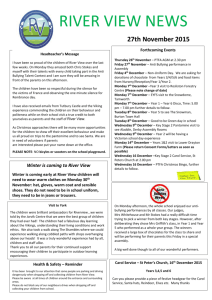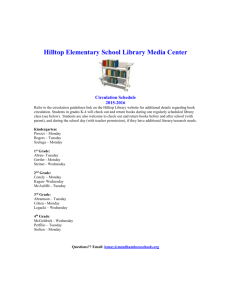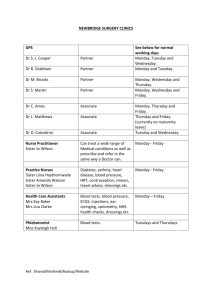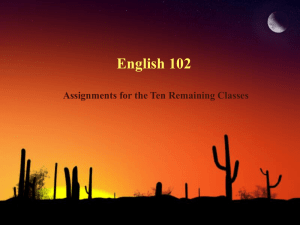Syllabus - Bonnie Glass
advertisement
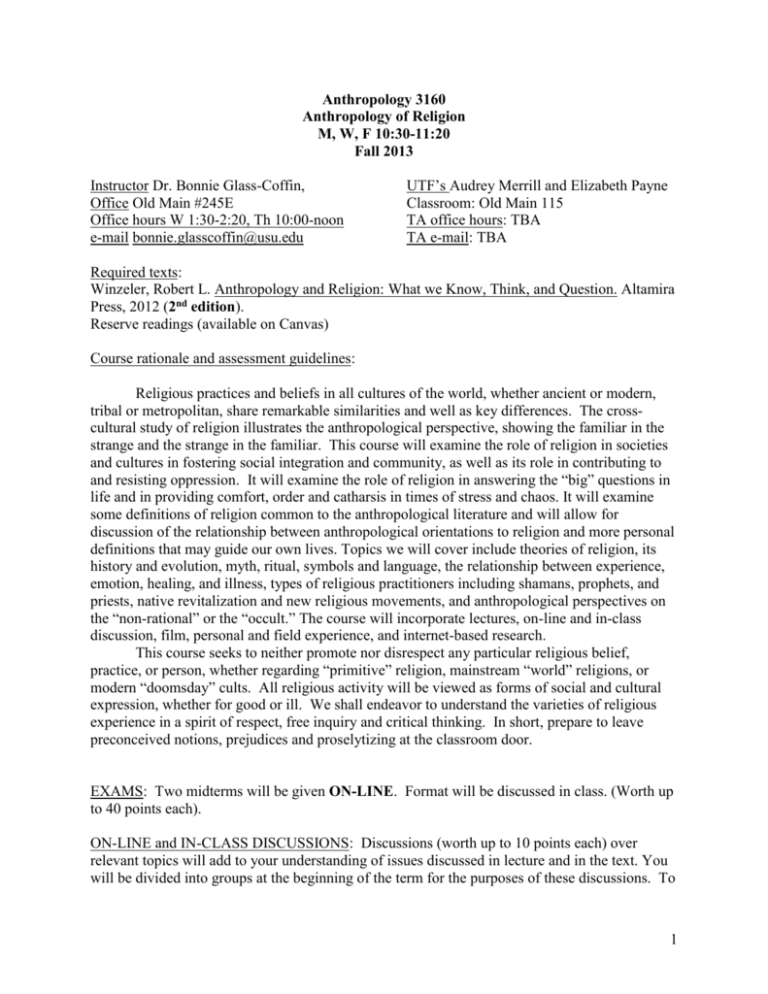
Anthropology 3160 Anthropology of Religion M, W, F 10:30-11:20 Fall 2013 Instructor Dr. Bonnie Glass-Coffin, Office Old Main #245E Office hours W 1:30-2:20, Th 10:00-noon e-mail bonnie.glasscoffin@usu.edu UTF’s Audrey Merrill and Elizabeth Payne Classroom: Old Main 115 TA office hours: TBA TA e-mail: TBA Required texts: Winzeler, Robert L. Anthropology and Religion: What we Know, Think, and Question. Altamira Press, 2012 (2nd edition). Reserve readings (available on Canvas) Course rationale and assessment guidelines: Religious practices and beliefs in all cultures of the world, whether ancient or modern, tribal or metropolitan, share remarkable similarities and well as key differences. The crosscultural study of religion illustrates the anthropological perspective, showing the familiar in the strange and the strange in the familiar. This course will examine the role of religion in societies and cultures in fostering social integration and community, as well as its role in contributing to and resisting oppression. It will examine the role of religion in answering the “big” questions in life and in providing comfort, order and catharsis in times of stress and chaos. It will examine some definitions of religion common to the anthropological literature and will allow for discussion of the relationship between anthropological orientations to religion and more personal definitions that may guide our own lives. Topics we will cover include theories of religion, its history and evolution, myth, ritual, symbols and language, the relationship between experience, emotion, healing, and illness, types of religious practitioners including shamans, prophets, and priests, native revitalization and new religious movements, and anthropological perspectives on the “non-rational” or the “occult.” The course will incorporate lectures, on-line and in-class discussion, film, personal and field experience, and internet-based research. This course seeks to neither promote nor disrespect any particular religious belief, practice, or person, whether regarding “primitive” religion, mainstream “world” religions, or modern “doomsday” cults. All religious activity will be viewed as forms of social and cultural expression, whether for good or ill. We shall endeavor to understand the varieties of religious experience in a spirit of respect, free inquiry and critical thinking. In short, prepare to leave preconceived notions, prejudices and proselytizing at the classroom door. EXAMS: Two midterms will be given ON-LINE. Format will be discussed in class. (Worth up to 40 points each). ON-LINE and IN-CLASS DISCUSSIONS: Discussions (worth up to 10 points each) over relevant topics will add to your understanding of issues discussed in lecture and in the text. You will be divided into groups at the beginning of the term for the purposes of these discussions. To 1 receive full credit for participation in these discussions, you will need to do 2 things. First, you read the assigned article from the accompanying reader and prepare for class discussion. To do this, you will, prior to the start of class on the day of the discussion, post on Canvas two or three questions or comments about the article that you would like to bring up during the discussion (these postings, when they demonstrate critical thinking, understanding of the article’s key points, and timely completion are worth up to 5 points). Second, you come to class on the day of discussion and actively participate (your presence is noted by the group-leader on a signup sheet that is turned in with the group-leader’s discussion paper and is awarded an additional 5 points). You must be in-class on the day of the discussion to receive these points. No exceptions can be made to this policy because these points are reflective of your in-class participation in the discussion. In consideration of the possibility that there may be discussion days that you must miss, I have scheduled 14 on-line/in-class discussion opportunities but participation in only 12 is required. If you choose to participate in more than 12 on-line/in-class discussions, you may use these as an extra-credit opportunity. (Worth up to 120 points with an additional possible 40 points of extra credit). PROJECTS: Three class projects will allow you to deepen your critical thinking skills, will give you practice with written expression, and will help get you out of the classroom and “into the field.” These will be discussed in more detail in class. They are as follows: 1) A one-two page personal assessment of “what religion means to me” that will allow you to consider your own beliefs and practices in the context of anthropological perspectives. This will be due early in the term. (Worth up to 10 points) 2) A one-two page description of participant observation of a religious ritual that is NOT part of your personal faith/religious experience. This exercise requires you to step outside the bounds of your own religious beliefs and behaviors while introducing you to a congregation of believers different from your own. To complete this assignment attend at least one ritual performance of a faith-based organization to which you do not belong and describe the ritual process using etic as well as emic measures (we will discuss these in class). The purpose of this assignment is to give you an opportunity to experience anthropological fieldwork and to deeply engage the concepts of cultural relativism, ethnocentrism, emic and etic forms of analysis, and anthropological theories on the foundations and functions of religion from an anthropological perspective. It is also to reflect upon Geertz’s definition of religion as an institution with cognitive, emotional, psychological, and social functions. Details will be discussed in class. (Worth up to 20 points) 3) Use of the internet to explore, describe, and analyze one “new religious movement” from an anthropological perspective. Details will be discussed in class. This project will be presented in lieu of a final exam. (Worth up to 70 points) TOTAL POINTS POSSIBLE: Midterm exams In-class/on-line discussions Reflection papers Final project Total points possible: 40x2 = 80 12x10 = 120 10 + 20 = 30 70 300 2 Extra credit on-line/in-class discussions:10x2 = 20 Late/Make-up Assignment Policy: In-class discussion points cannot be made up. Make-up of all other assignments is at instructor discretion and must generally be arranged for by students requiring accommodations prior to the due-date scheduled. Late assignments may be accepted, at instructor discretion, but frequently result in a point penalty. ASSESSMENT GUIDEINES: (a complete discussion of assessment guidelines in anthropology are available at www.usu.edu/anthro/assessment.html). The mission of the Anthropology Program at Utah State University is to prepare students for careers requiring skills and knowledge from a synthesis of the liberal arts and natural sciences. Graduates in anthropology are broadly thinking individuals exhibiting intellectual depth, effective reading and writing skills, and the ability to solve problems that span the humanities, the natural sciences, and the cultural diversity characteristic of the modern world. Specific Learning Goals of this course as these relate to the Mission Statement include the following: Successful completion of this course contributes to a) disciplinary knowledge of the nature, intent, and scope of anthropology, provides in depth exposure to cultural anthropology and especially its long standing concern for understanding human similarity and difference of religious experience and belief as a window to culture, familiarity with epistemologies and theories of both humanities and social sciences in the study of religion, and development of the ability to recognize and to respect human differences. This course familiarizes students with the anthropological method known as participant observation and contributes to skill development and career competency by providing practice a) reading material appropriate to course levels, b) communicating effectively in writing and orally, c) conducting research, using a computer, and internet as well as print resources d) encouraging critical thinking about issues in ways that require a synthesis of perspectives in a culturally diverse world. Course assignments are designed to foster these skills and include opportunities to engage in a) fieldwork, b) oral and written expression, c) critical thinking, d) mastery of concepts that are assessed via oral and written assignments, and objective tests. The instructor is open to feedback and constructive suggestions for improvement of content delivery and assessment via e-mail at bonnie.glasscoffin@usu.edu, via Blackboard, or via face-to-face meetings during office hours or by appointment at her office in Old Main 245E. ADA and FERPA: IN COOPERATION WITH THE DISABILITY RESOURCE CENTER, reasonable accommodation will be provided for students with disabilities. Please meet with the instructor during the first week of class to make arrangements. Alternative format print materials, large print, audio, diskette or Braille, will be available through the Disability Resource Center. The Family Education Right to Privacy Act prohibits grades, graded-essays, or any other form of graded assignment from being released by phone or from being placed in a public setting (e.g. outside the classroom, etc.) except with explicit written permission from the student in question. Course Outline: 3 Week #1 (Aug 26, 28, 30) Reading assignment: Chapter 1 Monday: Introduction to class: The Scope of Anthropology and the Definition of Culture Wednesday: In-class discussion: "Body Ritual Among the Nacirema” Friday: What is religion? Anthropological definitions and viewpoints Week #2 (Sept 4, 6) Reading assignment: Chapter 2 of text Monday: NO CLASS…LABOR DAY Wednesday: The four building blocks of religion: Unity and Diversity of Religion Friday: Religion as Beliefs in Spirit or as Relatedness to Divine (Harris and Lee in Lehmann and Myers) discussion Week #3 (Sept 9, 11, 213) Reading assignment: Chapter 3 of text Monday: Religion, Evolution and Prehistory Wednesday: Ancient Religions of the Mediterranean video Friday: Reading: Epilogue (Sanday in Hicks) and in-class discussion, “has the ‘goddess’ disappeared?” Week #4 (Sept 16, 18, 20) Reading assignment: Chapter 4 of text Monday: Religion, Adaptation and the Environment Wednesday: Reflection paper #1 due and in-class discussion “what is religion?” Friday: Anthropological methods in the study of religion and Dubisch (in Lehmann and Myers) Week #5 (Sept 23, 25, 27) Reading assignment: Chapter 5 of text. Monday: Religion and the Nature/Culture Debate: On Natural Symbols Wednesday: TBA Friday: Reading, Mary Douglas, “Taboo” (in Lehmann and Myers). Week #6 (Sept 30, Oct 2, 4) Reading assignment: Chapter 6 of text Monday: Religion and Mythology Wednesday: Film: Selection from Joseph Campbell, TBA Friday: Reading and Discussion Leach, “Genesis as Myth” Week #7 (Oct 7, 9, 11) Reading assignment: Chapter 7 of text. Monday: Religious Ritual Wed Reading and Discussion: Turner, “Betwixt and Between” (in Lehmann and Myers) Fri, "Video: “Holy Things for the Holy and Pure,” intro to the Holy Qurbana OR “The Holy Ghost People 4 Week #8 (Oct 14, 16, 17) Reading assignment: Chapter 8 of text Monday: Midterm #1 Wednesday: Witchcraft and Sorcery, overview and Reading “Dark Side of the Shaman.” Thursday: Presentation: USUPA Week #9 (Oct 21, 23, 25) Reading assignment: Chapter 9 of text. Monday: Shamanism and Neo-Shamanism Wed: Joralemon, 1990 Fri: Video: Healing States and reflection paper #2 due Week #10 (Oct 28, 30, Nov 1) Reading assignment: Chapter 10 of text Monday: Monday: Introduce Term Project Wednesday: Lecture: Religious movements and revitalization Friday: Reading and Discussion: Kehoe “Ghost Dance Religion” and discussion (in Lehmann and Myers) Week #11 (Nov 4, 6, 8) Reading assignment: Chapter 11 of text Monday: Anthropology and World Religions Wednesday: Reading and discussion, “Biblical Literalism: Constricting the Cosmic Dance” AND “the Chicago Statement on Inerrancy” (http://www.religiononline.org/showarticle.asp?title=1332) AND http://www.spurgeon.org/~phil/creeds/chicago.htm. Friday: Film: “The Forbidden Garden” Week #12 (Nov 11, 13, 15) Reading assignment: Chapter 12. Monday: Religious Change in Social and Political Context Wednesday: Video “Miracles Are Not Enough” or Friday: Reading: “The Transforming Influence of American Gatherings” (in Hicks) Week #13 (Nov 18 ONLY) Reading assignment: None Monday: Midterm #2 Wed.-Fri. THANKSGIVING BREAK Week #14 (Nov 25, 27, 29) Reading assignment: TBA (More on Religious Change and the Anthropological Perspective) Monday: Lewis “Urban Rastas in Jamaica” and discussion (in Lehmann and Myers) Wed: TBA: Youtube: https://www.youtube.com/watch?v=l8MWSMoEJdw or Guest Lecture Fri: No meeting, work on term projects 5 Week #15 (Dec 2, 4, 6) Reading assignment: TBA (Evaluating the non-rational: Anthropological perspectives) Monday: Reading: Glass-Coffin, 2010 Wednesday: Reading: “Occult Beliefs” (in Lehmann and Myers) Friday: Course wrap up FINAL PROJECT DUE: Wednesday, DEC. 11th, 5:00 p.m. 6

